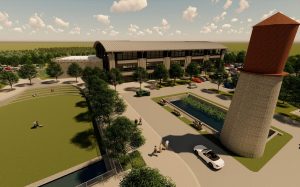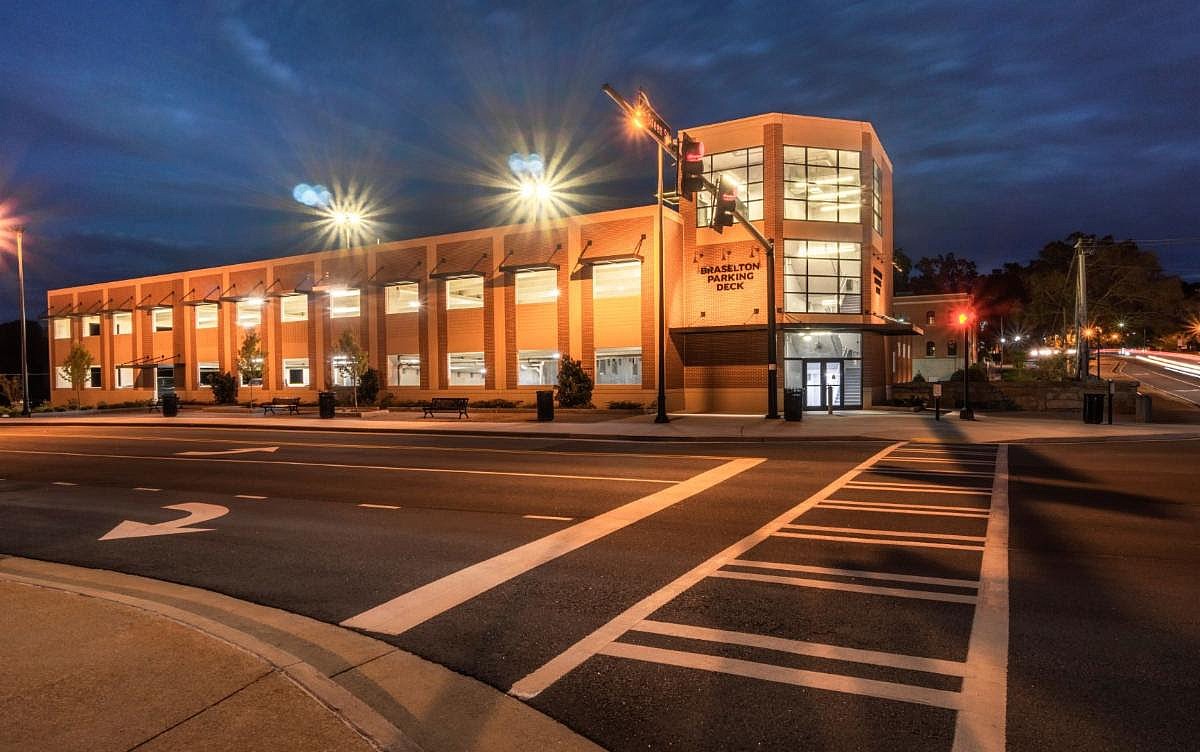GwinnettForum | Number 19.99 | March 27. 2020
AWARD WINNER: The Town of Braselton’s downtown parking deck has earned a statewide award for construction excellence. The Associated General Contractors of America (AGC) awarded Braselton first place in the 2020 AGC Build Georgia Awards. Located at the intersection of Georgia Highway 53 and Davis Street, it has four levels, 270 spaces, and two electric vehicle charging stations. BM&K Construction and Engineering of Braselton, the design-build engineer for the project, mixed the architectural styles of the historic Braselton Bros. Store and the adjacent Municipal Complex. The deck provides complimentary parking for downtown businesses and events as well as a future civic center. Construction of the SPLOST-funded civic center is slated to begin in 2020.
 TODAY’S FOCUS: Where Will the CoViD-19 Pandemic Hit the Economy Next?
TODAY’S FOCUS: Where Will the CoViD-19 Pandemic Hit the Economy Next?
EEB PERSPECTIVE: Early Morning Grocery Shopping Finds Unusually Easy Maneuvering
ANOTHER VIEW: Here’s a Guy Who Had Training for Today’s Quarantine Situation
SPOTLIGHT: Precision Planning, Inc.
FEEDBACK: Administration’s Public Health Failure Open for All to See
UPCOMING: Gwinnett’s The Water Tower To Begin Training Professionals Soon
NOTABLE: Animal Shelter Open, But Limiting Visitors Inside at a Time
RECOMMENDED: A Murder Is Announced by Agatha Christie
GEORGIA TIDBIT: J & J Industries of Dalton, Makes Broadloom Carpet Since 1950s
MYSTERY PHOTO: This Mystery Photo Doesn’t Ask Where, But Instead “What?”
Where will the COVID-19 pandemic hit the economy next?
By Jason Delaney
Associate professor of economics, Georgia Gwinnett College
LAWRENCEVILLE, Ga. | Students are home from school, learning online. Gwinnett Stripers games are postponed. Gwinnett playgrounds, arcades, and live venues are closed. These critical responses to the CoViD-19 pandemic carry costs: in lost wages and in reduced long-term growth for local businesses. With a federal response in the works, and record numbers of jobless claims making headlines, what can we expect to see in the economy next?
By industry, the travel and hospitality sectors were the first to be hit hard, followed quickly by events and restaurants, and then schools and personal services. With shelter in place orders following quickly behind, every non-essential industry is going to be at risk.
As companies respond to decreases in revenue, and households weather decreases in household income, we can understand the ways that all economic activity is interconnected. One company’s reduction in orders becomes its employees’ and shareholders’ reduction in income, which then becomes their reduction in saving and spending.
So where we would expect the second- and third-order effects to be felt? Businesses that served these other businesses will struggle to make up for lost demand.
Business-to-business sales do not seem like an obvious weak point in response to a pandemic. Unlike cruise ships or large events, these sales often require little interpersonal contact and may involve contracts that span a long period of time. Nonetheless, just as hotels and cruise lines, event centers and restaurants close down, the industries that supply them are hit, and those industries reduce their orders.
Household spending will focus on necessities rather than luxuries. As households try to figure out how to get by with less, they refocus their plans. Every household has housing and food as their first priorities, with other less critical expenditures farther down the list.
Clearly vacation budgets have been reduced, but where else can we expect people to make cuts? Home improvements, new car purchases, and purchases of other long-term durable goods are likely to be postponed. In addition to these cuts, we can expect families to make tough choices on other discretionary expenditures, including clothing purchases, entertainment, and home furnishings.
Overall, charitable giving and tax revenue will decline.
With any crisis, critical non-profit organizations and state and local governments are heavily relied upon for their services, especially during the early phases. With natural disasters, we typically see a spike in charitable giving, especially to headline organizations. Right now, we are witnessing that spike.
What makes this pandemic different is that it will be followed by an extended period of reduced economic activity, and with that comes an inevitable decline in charitable contributions, particularly to special causes unrelated to the crisis. As donors and taxpayers see their own income disappear, the non-profit and government organizations they support begin to suffer as well.
Federal spending can make up some of the decrease in funding through grants to continue providing services. But after years of slow-but-steady economic growth, government and non-profit budgets are going to struggle throughout 2020 and into 2021.
We will look back upon this pandemic as the most significant economic disruption in our lives. Uncertainty has already presented difficulties in planning and preparation. People need help, and will continue to need help. Knowing what to expect next can help reduce the economic suffering we all endure
- Have a comment? Send to: elliott@brack.net
Early-morning grocery shopping finds easy maneuvering
By Elliott Brack
Editor and Publisher, GwinnettForum
MARCH 27, 2020 | Needing to re-stock our refrigerator and pantry, I left the house at 6:59 a.m. to take advantage of Publix’ “Old Folks” early opening. I arrive at 7:09 to find not many shoppers—perhaps a dozen or so, including several from our neighborhood. It’s not that often when shopping in this vast and diverse metro complex that you find people you know in grocery stores.
 Some people had their carts fairly full, including a lady with a big square package of toilet paper. “That problem must have been solved,” I thought to myself.
Some people had their carts fairly full, including a lady with a big square package of toilet paper. “That problem must have been solved,” I thought to myself.
Most shelves were more than three-quarters full, the work of an overnight crew, we presumed. One fairly long shelf was virtually empty—-one that would have normally been full of rice products. There were six or eight varied packages of rice products scattered along the many open shelves. Evidently, rice is a true fixture in many a local diet.
Earlier we had been hunting ground turkey, and we came across just one packet. I suspect the better-priced packages had been scooped up. I got an upscale brand, but at least we had what we were looking for.
Meanwhile, the fresh meat section was well-stocked. Earlier we had heard that this case was mostly empty, but at least in the early morning, it had sufficient choices.
Again this morning, as I found earlier in the week, even though the store was limiting customers to one carton of eggs, there were only a few cartons randomly placed along the long shelves. A few were turned sideways, and I suspect that came from a shopper inspecting for broken eggs. On my last trip to this shelf, there was only one carton of eggs left….and one of the eggs was slightly cracked. However, I bought that damaged carton, since at least I was getting 11 uncracked eggs.
Milk of all kinds was limited to one per customer. While whole milk was readily available, any special milk or almond milk was another story, with lots of empty spaces in the cooler.
Going into the fresh produce area, this pipeline must be vigorous, for there were plenty of fruit, berries, greens and root vegetables everywhere. It made you feel good just to see all these lush and ripe foods awaiting some hungry mouths. Not because of the shortage scare, but because it’s not quite time yet, I found no Vidalia onions. OK, one area said “Georgia onions.” I still held off, waiting until better tasting Vidalias arrived.
The frozen food compartments were not as full as the rest of the store…particularly the pizzas, et. al., while the ice cream section had a lot of empty spaces.
At checkout, there were no lines at all, and I zoomed through this quickly. Time I got back to the car and drove home, it was 7:45 a.m. It was an easy outing. It was a rare uncrowded shopping trip, allowing me to replenish our larder. Thanks, Publix, for looking out for the old folks.
From Tim Anderson in the Herald-Leader of Fitzgerald: “Hollywood’s favorite couple, Tom Hanks and his wife, Rita Wilson, are in Australia with the coronavirus. Being the practical man he is, Hanks said this week: “It’s simple. Once we were diagnosed, we went into quarantine and will stay here until they say we are okay to leave.” Wilson quipped: “After this, the only Corona I want comes from Mexico, and you drink it.”
- Have a comment? Send to: elliott@brack.net
Here’s a guy who had training for today’s quarantine
By Raleigh Perry
BUFORD, Ga. | When I was drafted and joined the Navy instead of the Army – that was back when the ships were made of wood and the men of steel — I quickly learned what “quarantine” meant.
I spent 14 weeks in boot camp in San Diego and during that time, it was not until the day before graduation that we were allowed to leave the base. During those 14 weeks, all we did was to go to classes, spend two days at the rifle range, and perform exercises. I entered boot camp at 140 pounds and came out at 175 pounds, but no fat. I still wore the trousers that I wore when I entered, but my suit coat went from a 36 Long to a 42 Long. A lot happened in those 14 weeks.
In Air Force and Army boot camps the soldiers and airmen could get permission to leave the base on weekends. That was not so with the Navy and Marines, whose training was 6-8 weeks longer than the Navy. We were confined to the base and, for the most part, we could not leave the area of the barracks when we were not in classes. We were quarantined!
You find out why when you are on a ship. We would leave a port in Japan, for instance, and head for Vietnam, but the places that we tied up in Vietnam were generally susceptible to incoming rounds, so we could not leave the ship. We might stop at several places in Vietnam before we headed to yet another port to pick up more cargo. We could be on the ship for three weeks or more.
 My ship was an old Landing Ship Tank (LST), the USS Monmouth, hull number 1032. She was only 330-feet long and at the widest point, 50 feet. (Landing Ship Tank ships were the type that you see in World War II movies nosed up on the beach with a ramp down to drive off tanks, trucks, jeeps. These were shallow draughted to allow them to beach.)
My ship was an old Landing Ship Tank (LST), the USS Monmouth, hull number 1032. She was only 330-feet long and at the widest point, 50 feet. (Landing Ship Tank ships were the type that you see in World War II movies nosed up on the beach with a ramp down to drive off tanks, trucks, jeeps. These were shallow draughted to allow them to beach.)
Berthing quarters were in a compartment that was about 8×20 feet wide and there was, in my compartment, room for nine men to sleep. Our beds were called racks and they were on hooks on the bulkhead side and secured when in use on chains. They were “triced” up against the bulkhead so as to make cleaning the space easier and were secured against the bulkhead up during the day. That is nothing more than confinement to say the least. Working areas, like my office, were also small.
Realistically, we were quarantined, there was really no place to go except to your work space, the galley (“mess hall” to those not used to Navy lingo) and our sleeping quarters. With a small galley and 100 men to eat you did not linger; you ate and left. Other than being onboard the ship, the only place you could go is over the side.
Altogether, I was in the Navy for a four-year enlistment, and spent one year at sea in Vietnam.
Being quarantined was not all that bad and it makes it easier to be quarantined today. Today’s staying in the house has not been an unpleasant thing. The computer makes it easier. Plus, there is all sorts of funny stuff you can find in relation to quarantine if you look for it.
- Have a comment? Send to: elliott@brack.net
Precision Planning, Inc.
 Today’s underwriter is Precision Planning, Inc., a multi-disciplined design firm based in Lawrenceville, Georgia with a 37-year history of successful projects. In-house capabilities include Architecture; LEED® Project Management; Civil, Transportation and Structural Engineering; Water Resources Engineering; Landscape Architecture; Interior Design; Land and City Planning; Land Surveying; and Grant Administration. PPI has worked diligently to improve the quality of life for Georgia communities through creative, innovative planned developments, through the design of essential infrastructure and public buildings, and through promoting good planning and development principles. Employees and principles are involved in numerous civic, charitable and community based efforts in and around Gwinnett County.
Today’s underwriter is Precision Planning, Inc., a multi-disciplined design firm based in Lawrenceville, Georgia with a 37-year history of successful projects. In-house capabilities include Architecture; LEED® Project Management; Civil, Transportation and Structural Engineering; Water Resources Engineering; Landscape Architecture; Interior Design; Land and City Planning; Land Surveying; and Grant Administration. PPI has worked diligently to improve the quality of life for Georgia communities through creative, innovative planned developments, through the design of essential infrastructure and public buildings, and through promoting good planning and development principles. Employees and principles are involved in numerous civic, charitable and community based efforts in and around Gwinnett County.
- Visit their web site http://www.ppi.us.
- For a list of other sponsors of this forum, click here.
Administration’s public health failure open for all to see
Editor, the Forum:
![]() President Trump apparently tried to will the coronavirus pandemic into nonexistence; and he, his party, and his propaganda-press supporters now give the false impression that he was aware of the pandemic’s threat and acted decisively to address it. During the time President Trump and his propaganda press were pumping stocks, twisting statistics, and misleading the public, Americans lost valuable time to prepare for the pandemic. Many, who only worry now, will suffer greatly in the next few months as they get sick or find their workplaces closed because of the president’s misrepresentations.
President Trump apparently tried to will the coronavirus pandemic into nonexistence; and he, his party, and his propaganda-press supporters now give the false impression that he was aware of the pandemic’s threat and acted decisively to address it. During the time President Trump and his propaganda press were pumping stocks, twisting statistics, and misleading the public, Americans lost valuable time to prepare for the pandemic. Many, who only worry now, will suffer greatly in the next few months as they get sick or find their workplaces closed because of the president’s misrepresentations.
A global pandemic would challenge any administration. But this administration’s misrepresentations about it led to a tragic public health failure for America.
It’s about time for this reality-show president and his supporting cast to start telling the truth for the sake of the lives and wellbeing of actual Americans.
— Michael Wood, Peachtree Corners
Pandemic years ago, the Great Plague, gives one pause
Editor, the Forum:
In view of the pandemic we are now in, I have just finished reading about the Great Plague, and the Black Plague of Europe. Also just finished a long article on Sir Issac Newton. Stunning! I knew that a bunch of folks died during those years, but my account was beyond description!
Makes our present condition seem insignificant, though of course, it is not. And, those people didn’t just have one plague. There were many following. Gives one pause.
— David Earl Tyre, Jesup
Send us your thoughts: We encourage you to send us your letters and thoughts on issues raised in GwinnettForum. Please limit comments to 300 words. We reserve the right to edit for clarity and length. Send feedback and letters to: elliott@brack.net
Gwinnett’s tower to begin training professionals soon
The Water Tower at Gwinnett, the new water research and education center, will begin training its first class of water professionals in 2020 to operate and maintain publicly owned water and wastewater systems.
 Working with research groups, universities, and international associations, the Water Tower will help guide policy makers across the globe to discover new ways to find, clean, and reuse water and to train the next generation of water professionals on using emerging technology. The Water Tower Field Training Center will open in the fourth quarter of this year.
Working with research groups, universities, and international associations, the Water Tower will help guide policy makers across the globe to discover new ways to find, clean, and reuse water and to train the next generation of water professionals on using emerging technology. The Water Tower Field Training Center will open in the fourth quarter of this year.
The Water Tower’s founding partner, the Georgia Association of Water Professionals, in conjunction with the Gwinnett County Department of Water Resources and the private sector, will augment an already robust training program by enabling prospective operators to gain on-the-job experience and helping practicing operators hone their skills and develop new expertise.
The Water Tower connects the classroom to field learning by offering real-world scenarios in a monitored environment with technical training on innovative technologies. Utility operator certification exams can be challenging; courses at the Water Tower will focus on specific areas of difficulty to ensure students are prepared to pass their exams.
Additionally, the Water Tower offers advanced training courses to enhance certified operators’ knowledge of new technologies and techniques, such as maintenance technologist, wastewater treatment, and wastewater laboratory analyst courses. Classes begin soon. To learn more about upcoming training courses at the Water Tower, email Chad Wilbanks at Chad@theh2otower.org or visit the website: Theh2oTower.org/training.
County-wide burning ban goes into effect immediately
By order of the Gwinnett County Fire Marshal’s office, an outdoor burning ban is in effect. The ban is in response to the COVID-19 pandemic, which has been declared both a national emergency and a state public health emergency.
Gwinnett Fire Chief Russell Knick reminds residents that the Gwinnett County Department of Fire and Emergency Services provides all of the emergency medical response services in the county. He says: “Responding to calls for service related to outdoor fires will divert the department’s personnel and resources from providing critical services during this public health crisis.”
The following outdoor fires are prohibited: burning of leaves, limbs and natural vegetation that may fall on one’s property; prescribed burning; acquired structure burns; vegetative debris from storms; and weed abatement, disease and pest prevention.
The safe use of campfires and BBQ grills is still allowed and does not require a permit. As always, people should exercise extreme caution when using grills or campfires. The use of charcoal, wood and gas grills on combustible balconies or within 10 feet of combustible construction is prohibited year-round for commercial buildings and apartments under the Gwinnett County Fire Ordinance.
The ban imposed by the order will remain in effect March 23 through April 30 at 11:59 p.m., when the annual burn ban will go into effect through Sept. 30. The Gwinnett County Code of Ordinances allows the Fire Marshal’s Office to temporarily prohibit outdoor fires when local circumstances make such fires hazardous
Animal shelter open, but limiting visitors to 10 at a time
In response to the COVID-19 pandemic, Gwinnett Animal Shelter will limit visitors inside the shelter to 10 at a time during regular business hours.
 Alan Davis, Gwinnett Animal Welfare and Enforcement division director, says: “We are committed to providing a safe environment where residents can find their lost pets as well as an opportunity for our shelter pets to find a home. We are taking precautions inside the shelter to limit the spread of COVID-19 including thorough daily cleaning as recommended for sanitizing hard surfaces.”
Alan Davis, Gwinnett Animal Welfare and Enforcement division director, says: “We are committed to providing a safe environment where residents can find their lost pets as well as an opportunity for our shelter pets to find a home. We are taking precautions inside the shelter to limit the spread of COVID-19 including thorough daily cleaning as recommended for sanitizing hard surfaces.”
Current shelter guidelines include:
- Until further notice, only 10 visitors at a time will be allowed into the shelter. Other visitors may wait in their cars or on the shelter property, maintaining appropriate social distancing as recommended by the CDC.
- Licensed rescues and approved fosters must call ahead for an appointment with shelter staff.
- Because space is limited at the shelter, it is recommended that pets stay with their families at this time. Owner surrenders are by appointment only.
Find more information on events, hours and available pets at GwinnettAnimalWelfare.com. Gwinnett Animal Welfare and Enforcement is located at 884 Winder Highway in Lawrenceville.
Dunn sworn in as new mayor of City of Lilburn
Timothy W. Dunn has been sworn in as Mayor of the City of Lilburn with City Attorney Richard Carothers administering the oath of office. Dunn, who was running unopposed for the office of Mayor, was to be included on the ballot during a Special Election to be held on May 19, 2020. As the only candidate for the position of Mayor, the Superintendent of Elections for the City of Lilburn declared Dunn the winner and officially certified him Mayor on March 23, 2020. He has been on the city council since 2007. The city will hold a Special Election on May 19, 2020 to fill Dunn’s vacancy on the Council.
A Murder Is Announced by Agatha Christie
![]() From Susan McBrayer, Sugar Hill: There’s nothing like being cooped up in the house for 10 days to trigger my craving for the familiar and comforting classic mysteries of Agatha Christie. A Murder is Announced is a Miss Marple story that takes place in a small English village (surprise, surprise) and begins with an announcement in the newspaper that a murder will take place at the home of a local spinster, Lettie Blacklock. Neighbors are agog and show up at Miss Blacklock’s home at the appointed hour. Sure enough, someone is murdered. The rest of the story involves the police and Miss Marple trying to untangle the mystery and discover the murderer. Does someone have it in for the spinster? Are people really who they say they are? Everyone is a suspect. Kindness, greed and violence all come together in this cozy mystery. And, oh yea, there’s another murder along the way, too. Good fun!
From Susan McBrayer, Sugar Hill: There’s nothing like being cooped up in the house for 10 days to trigger my craving for the familiar and comforting classic mysteries of Agatha Christie. A Murder is Announced is a Miss Marple story that takes place in a small English village (surprise, surprise) and begins with an announcement in the newspaper that a murder will take place at the home of a local spinster, Lettie Blacklock. Neighbors are agog and show up at Miss Blacklock’s home at the appointed hour. Sure enough, someone is murdered. The rest of the story involves the police and Miss Marple trying to untangle the mystery and discover the murderer. Does someone have it in for the spinster? Are people really who they say they are? Everyone is a suspect. Kindness, greed and violence all come together in this cozy mystery. And, oh yea, there’s another murder along the way, too. Good fun!
- An invitation: what books, restaurants, movies or web sites have you enjoyed recently? Send us your recent selection, along with a short paragraph (100 words) as to why you liked this, plus what you plan to visit or read next. Send to: elliott@brack.net
Dalton’s J & J Industries makes broadloom carpet since ’50s
J & J Industries, located in Dalton, is one of the largest privately held commercial broadloom manufacturers in the carpet industry. Founded by Rollins Jolly and Tom Jones during the 1950s carpet boom in northwest Georgia, the company initially manufactured candy-striped carpets and braided rugs but now exclusively produces commercial carpets.
 After graduating from the University of Georgia in Athens, Jolly worked 20 years in textile manufacturing in North Carolina and Georgia. In 1953 he opened Jolly Textiles in Dalton, selling yarn, jute and duck backing, and yarn cones. He also founded Dalton Cone Company to reprocess used cones and transform carpet remnants into rugs.
After graduating from the University of Georgia in Athens, Jolly worked 20 years in textile manufacturing in North Carolina and Georgia. In 1953 he opened Jolly Textiles in Dalton, selling yarn, jute and duck backing, and yarn cones. He also founded Dalton Cone Company to reprocess used cones and transform carpet remnants into rugs.
In 1957 Jolly bought a truck for his business from Jones, a graduate of the Georgia Institute of Technology in Atlanta with a degree in industrial management. Soon thereafter the men became business partners. Their new business, J & J Industries, initially made rugs from odd lots of yarn.
By 1967 Jolly and Jones had decided to focus exclusively on the commercial carpet business. That same year Jolly’s son, Jim Jolly, who became president of the company in 1986 and later assumed the roles of chairman and chief executive officer, joined the organization.
The industry was just introducing “fine gauge tufting,” which used more needles per square inch to produce a very dense product. The unique product was much in demand and sold well, despite the lack of an adequate sales organization at J & J. At that time, the company’s main competitors were the woven-carpet manufacturers Bigelow, Lees, and Mohawk.
Currently J & J sells most of its carpet for use in corporate office buildings, with additional sales to schools, retail stores, hospitals, airports, and the like.
J & J has worked to be an industry leader in reducing pollutants and minimizing the environmental impact on air, water, and land. The nylon yarn and backing used to make carpets are composed of some recycled materials, and post-consumer carpet is incorporated into cement, decking boards, and marine pilings (or plastic “plywood”).
The company has also donated land adjacent to its facilities, which has been developed, in conjunction with such groups as the Nature Conservancy, into a wetlands area. These wetlands contain storm water and establish a riparian habitat in the Conasauga River watershed. Jolly was also active in relocating and expanding Dalton’s municipal airport, Jolly Field, which is named for him.
- To view the Georgia Encyclopedia article online, go to http://georgiaencyclopedia.org
This Mystery Photo doesn’t ask where, but instead “what?”
This Mystery Photo doesn’t ask that you identify where it is, thought you could throw in that detail. This time we’re seeking “what” it is, and this indoor angle might even lead you to where. But it’s tricky, so take caution.
 The most recent Mystery Photo was really a mystery to many, since only George Graf of Palmyra, Va. recognized it. He wrote: “This is San Juan Islands Sculpture Park, Roche Harbor Road, San Juan Island, Washington. The sculpture is called the ‘Blue Charm’ or also known as ‘Liquid Sky’ by Deedee Morrison, done in limestone, aluminum and Lucite. The artist is a nationally known public artist working on the forefront of designing solar powered and LED sculptures to communicate public priorities and vision. Morrison’s work combines traditional sculpture construction methods with cutting-edge digital design and fabrication technology. In Atlanta, Morrison was also commissioned for the nearby sculpture called ‘Fierce Urgency’ located at the MARTA Grant Street Tunnel Bridge. She used the Georgia Oak as the prototype. The tree was first discovered in 1849 at Stone Mountain, and exists in only a few locations in the area. It is Georgia’s only endemic oak and because of loss of habitat is on the endangered list and could be extinct within the next 10 years.” The photo came from Susan McBrayer of Sugar Hill.
The most recent Mystery Photo was really a mystery to many, since only George Graf of Palmyra, Va. recognized it. He wrote: “This is San Juan Islands Sculpture Park, Roche Harbor Road, San Juan Island, Washington. The sculpture is called the ‘Blue Charm’ or also known as ‘Liquid Sky’ by Deedee Morrison, done in limestone, aluminum and Lucite. The artist is a nationally known public artist working on the forefront of designing solar powered and LED sculptures to communicate public priorities and vision. Morrison’s work combines traditional sculpture construction methods with cutting-edge digital design and fabrication technology. In Atlanta, Morrison was also commissioned for the nearby sculpture called ‘Fierce Urgency’ located at the MARTA Grant Street Tunnel Bridge. She used the Georgia Oak as the prototype. The tree was first discovered in 1849 at Stone Mountain, and exists in only a few locations in the area. It is Georgia’s only endemic oak and because of loss of habitat is on the endangered list and could be extinct within the next 10 years.” The photo came from Susan McBrayer of Sugar Hill.
GwinnettForum is provided to you at no charge every Tuesday and Friday.
Meet our team
- Editor and publisher: Elliott Brack, 770-840-1003
- Managing editor: Betsy Brack
- Roving photographer: Frank Sharp
- Contributing columnist: Jack Bernard
- Contributing columnist: Debra Houston
- Contributing columnist: George Wilson
More
- Location: We are located in Suite 225, 40 Technology Park, Peachtree Corners, Ga. 30092.
- Work with us: If you would like to serve as an underwriter, click here to learn more.
Subscriptions to GwinnettForum are free.
- Click to subscribe.
- Unsubscribe. We hope you’ll keep receiving the great news and information from GwinnettForum, but if you need to unsubscribe, go to this page and unsubscribe in the appropriate box.
- © 2020, Gwinnett Forum.com. Gwinnett Forum is an online community commentary for exploring pragmatic and sensible social, political and economic approaches to improve life in Gwinnett County, Ga. USA.
















Follow Us